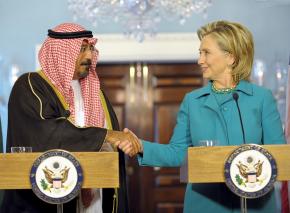Why the war on WikiLeaks?
The reason for the wild accusations against WikiLeaks is that the U.S. wants to keep Americans ignorant of what's done in their name, writes .
WIKILEAKS FOUNDER Julian Assange will be lucky to get out alive. The fanatics are in full cry against him.
Sarah Palin likens him to Osama bin Laden and wants him "hunted down." New York Republican Rep. Peter King demands that WikiLeaks be declared a terrorist organization. In mainstream newspapers, conservative commentator Jonah Goldberg apparently urges Assange's assassination, although he denies that's what he was doing.
The reason for their rage is that they are desperate to keep Americans in the dark. It's not the people of Saudi Arabia that they want left in ignorance of the Saudi role in financing global terrorism, but the people of their own land.
"Saudi Arabia remains a critical financial support base for al-Qaeda, the Taliban, LeT (Lashkar-e-Taiba) and other terrorist groups," said Hillary Clinton in a memo issued last December. Other WikiLeaks documents show that Lashkar-e-Taiba--the Pakistan-based Sunni group accused of behind the 2008 Mumbai attack--is funded virtually entirely from Saudi Arabia. And yet, according to Clinton 12 months ago, "It [remains] a challenge to persuade Saudi officials to treat [terrorist funding] as a strategic priority."

Let us imagine for a moment that Iran rather than Saudi Arabia had been revealed as the main source of funding for al-Qaeda, the Taliban, Lashkar-e-Taiba, etc. Does anyone doubt that Clinton would be thumping the lectern at a State Department Press conference, explaining that America's patience had run out and announcing that the bombers were winging their way even now toward Tehran to eliminate this threat to world peace? And anybody who voiced protest would be ridiculed as hopelessly naïve or denounced as an outrider of evil?
The State Department documents tell that another close U.S. ally in the region, the United Arab Emirates (UAE), is a source of substantial funds to the Afghan Taliban and the terrorist Haqqanmi network. Two senior Taliban officials are said to travel regularly to the UAE to launder money through front companies.
Then there's Kuwait. Kuwait owes the U.S. big time. The first Gulf War was undertaken in 1991 to expel Saddam Hussein's armies from the statelet and put the Al-Sabah family back in power. This was achieved at some cost in blood as well as treasure.
Now, however, according to documents from the State Department, Kuwait is a "source of funds and a key transit point" for al-Qaeda and similar groups. The Al-Sabahs crack down hard on any attacks on their own soil, but are "less inclined to take action against Kuwait-based financiers and facilitators plotting attacks outside of Kuwait."
The Kuwait regime has airily dismissed State Department pleas to ban the Revival of Islamic Heritage Society, which masquerades as a charity but has been denounced by the U.S. as a terrorist organization channeling money and material to al-Qaeda and Lashkar-e-Taiba.
However, the Gulf country singled out by the State Department as "the worst in the region" when it comes to combating terrorism is 2022 World Cup host Qatar.
FOUR LEADING sources of support for global terrorism on the Arabian Peninsula: Saudi Arabia, the UAE, Kuwait, Qatar.
Top four U.S. allies on the Arabian Peninsula: Saudi Arabia, the UAE, Kuwait, Qatar.
Herein lies the reason for the foam-flecked anger of Palin, Clinton, King, etc. The public, and particularly the American public, have been given a glimpse of the relationship between the U.S. administration and the Arab states, a real insight into how the U.S. chooses its allies, its enemies and its targets for attack.
They don't bear scrutiny. They bear no relationship to the guff about national security, peace in the world and such palaver as comes from Obama--just as it came from Bush and the other Clinton before him and the other Bush before that--as they whip up support for their wars.
Hence their demented, near-comical efforts to prevent Americans laying eyes on the WikiLeaks material. The Department of Defense has ordered hundreds of thousands of federal employees not to look at the documents even if they fall on the desk in front of them.
Recently, a spokesman for Obama said that while it wasn't an offense for government employees to read newspaper articles based on the material, they must immediately notify their "information security offices" if they come across a hard copy of any of the documents.
Students at the Colombia School of International and Public Affairs were told that they'd harm their chances of ever working in a government job if they became aware of someone spreading the documents online and failed to intervene to stop them. The government of Nicolas Sarkozy has called on all French companies and organizations to break links with WikiLeaks. In what Assange has aptly described as "the privatization of state censorship," both Amazon and eBay-owned PayPal have terminated their links to WikiLeaks.
The most significant aspect is how implacably determined they are to keep the American people ignorant of what is being said and done in their name. Not that things are any different on this side of the Atlantic, of course.
First published at the Belfast Telegraph.


